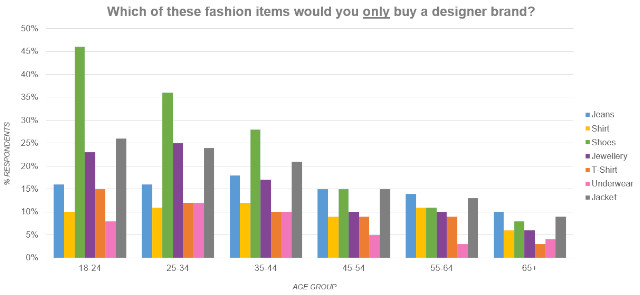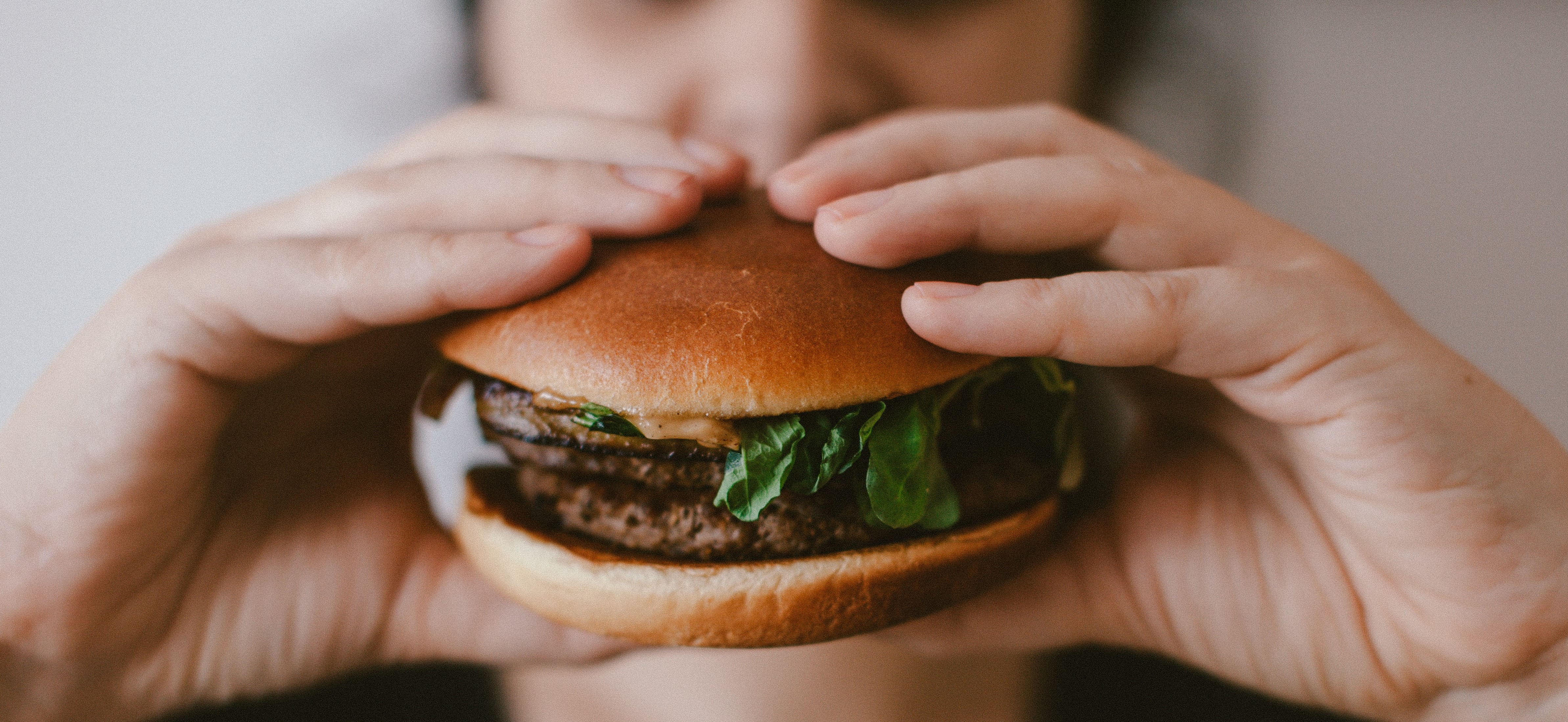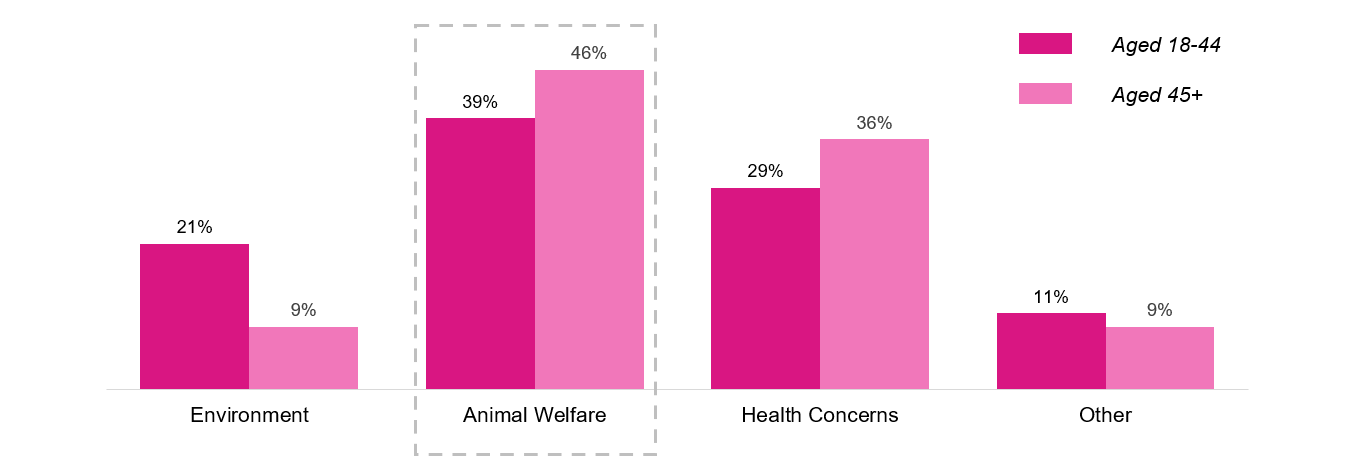MEN LIKE PRICEY SHOES BUT EVERYBODY LOVES CHEAP PANTS.
How much are we prepared to pay for our clothes?
We wanted to understand how age and gender effected people's attitude to fashion and the value placed upon clothes. We conducted a nationally representative study of 1000 members of the Great British public, represented by you, the Maximiles members. Here’s what you told us.


Nearly ¼ respondents would only buy shoes from a designer but cheap pants are fine.
We asked you which types of clothing you would only buy from a designer brand. For all age groups combined, way out at the top of the list was shoes. 23% of you said you would only go for known brands. Next up was jackets at 18%. Down the other end of the list, only 7% of you said you would only buy designer underwear. Cheap pants for the win!
Younger age groups are more focused on trendy footwear
When we split the data up and compared different age groups, the differences were clear (see graph above). Around 45% of members aged 18-24 would only wear shoes that were designer. This dropped with each increasing age group with only around 10% of over 65s saying the same thing. Conversely roughly the same number of members for each age group, only 8-10%, said that they would not wear a shirt unless it was designer.
Despite more women being interested in designer shoes, they are prepared to pay less for them than men
More women than men said that shoes had to be designer for them to wear them. 25% of women versus 20% of men. However women were much less prepared to pay a premium for designer shoes. Only 32% of women would pay over £60 for shoes compared to 43% of men.
In fact, men are prepared to pay more for 6 out of the 7 listed fashion categories
In fact, surprisingly, men were more likely to be prepared to pay over £60 in 6 out of the 7 categories of clothing in the survey. The only category where they scored lower than women? Underwear. Only 1% of men would pay over £60 for underwear versus 3% of women. Of course, that could be a reflection of the differences in complexity between men’s and women’s underwear. I mean, who’s ever seen a £60 pair of Y-fronts!?
----------------------------------------------------------------------------------------------------------------------------------------------
ANIMAL WELFARE A PRIORITY BUT MARMITE IS SUSPICIOUS!
Why do vegetarians and vegans stop eating meat?
It is estimated that at present more than a quarter of all evening meals consumed in the UK are vegan or vegetarian and that 10% of British children aged 8-16 are already vegan or vegetarian. It is predicted that by 2040 only 40% of the global population will consume meat. But what is behind the growth of non-meat diets?
We wanted to understand the main reason people are turning away from meat in the UK. We conducted a nationally representative study of 1000 members of the Great British public, represented by you, the Maximiles members. Here’s what you told us.


Animal welfare the primary reason for non-meat diet choices
Perhaps not surprisingly, animal welfare ranked number one on the list of reasons people chose when asked why they had stopped eating meat. This was a more significant factor in the 45+ age group, but not by much, as both age groups cited this as their number 1 reason.
Health concerns number two
Also high on the list were concerns about health. Both groups cited health concerns as the second most important reason for ditching meat in their diet. Again, this was slightly more of a concern for the older members. Perhaps this is also not surprising given older peoples' generally greater preoccupation with health issues.
Environment much more important for younger members
The area where the younger group showed a much greater focus than the older group was environmental concerns. a whopping 21% of 18-44s put this as their primary reason. This compared to just 9% for the over 45s.
Love it? Hate it? But do you trust it?
On a final note, in a secondary question it was revealed that popular food brand Marmite, may not be doing all it can to appeal to the vegetarian and vegan market. Only 27% of those questioned believed that Marmite was completely free of animal ingredients, despite being classified as a vegan friendly product.
---------------------------------------------------------------------------------------------------------------------------------------------------
DOG OWNERS MORE HEALTH CONSCIOUS. CATS MORE SPOILT!
Why do pet owners buy the brand of pet food they buy?
We wanted to understand the main reason people buy their primary brand of pet food. We conducted a nationally representative study of the Great British public represented by you, the Maximiles members. Here’s what you told us.


Cat owners prioritised the cat's preferences
Perhaps not surprisingly, cats tend to get exactly what they want from their owners. 52% of cat owners said that chose their pet food based on the preference of the cat. This compares with just 27% of dog owners. Poor dogs!
Dog owners prioritised the dog's health
More dog owners chose their pet food based on the health benefits than any other reason. At 35% this was almost double the number of cat owners at 16%. Solid, dependable, always guarding their best friend - perhaps dog owners are like their dogs after all!
Convenience not an issue for owners
At the bottom of the list for both sets of owners was the availability of the pet food. The availability of the food only factored into the desicion making of 10% of cat owners and 12% of dog owners. This suggests that both sets of owners had made a clear desicion about the brand of food that was right for them (and their furry friend).
-----------------------------------------------------------------------------------------------------------------------------------------------
